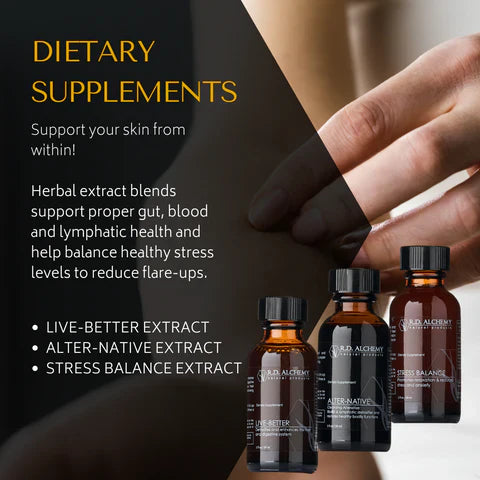If your skin flares up with the seasons, stress, or seemingly nothing at all… you’re not imagining it. Whether it's eczema, psoriasis, rosacea, or just that constant “everything I try makes it worse” sensitivity — your skin is trying to tell you something.
And while it’s easy to get lost in creams, prescriptions, or ingredient lists, true healing often starts with slowing down and listening — to your body, your skin, your story.
Here are a few natural, whole-body approaches that can help soothe sensitive skin and support real healing — not just symptom control.
1. Moisture is essential — but not all hydration is created equal
With conditions like eczema and psoriasis, the skin’s barrier function is often compromised. That means it loses moisture faster and becomes more reactive to outside irritants.
One of the simplest and most helpful things? Hydrating often and being mindful of how you moisturize. Water-based hydration (like a gentle mist or a damp cloth) is helpful to replenish, but it’s equally important to lock that moisture in — ideally right after a shower or bath, while the skin is still slightly damp.
Gentle, consistent moisturizing can do a lot over time — especially when the ingredients are minimal and nourishing.
2. Cool it down — for real
Hot showers feel amazing, but they can be brutal on sensitive or inflamed skin. Heat draws moisture away and can trigger redness, flaking, or itching.
Try lukewarm showers instead of hot, avoid long soaks during flare-ups, and if your skin is really irritated, a cool compress can offer real relief.
And on that note…
3. Check your water — it matters more than you think
Many people with chronic skin conditions see huge improvements after switching to a good shower filter.
Tap water often contains chlorine, heavy metals, and other residues that can be super irritating to the skin — especially when the skin barrier is already compromised.
A quality shower filter (especially one that filters chlorine and chloramines) can make a world of difference. It’s one of those low-effort, high-impact swaps that’s often overlooked.
4. Simplify your routine
Sensitive skin doesn’t need a 10-step skincare routine — it needs rest, breathability, and ingredients that don’t stir up more drama.
Avoid fragrance, essential oils during flare-ups, and harsh preservatives. A good rule of thumb: if you can’t pronounce it or wouldn’t eat it, think twice before putting it on your skin.
That goes for laundry detergents, soaps, perfumes, even the fabric softener you use. It all touches your skin.
5. Support your nervous system
This is a big one. Your skin is part of your nervous system — and it responds directly to stress, overwhelm, fear, and emotional tension.
When the body is stuck in a constant state of fight-or-flight, the immune system stays on high alert. That can look like flare-ups, inflammation, and hypersensitivity.
Breathing, walking, crying, journaling, acupuncture, talking it out, laughter, saying no — whatever helps you regulate and settle, lean into that.
6. A GNM lens: what’s your skin “separating” from?
German New Medicine (GNM) offers an emotional-energetic lens that some people find helpful. It sees eczema and other skin conditions as part of a biological healing process — specifically related to a "separation conflict."
That could be feeling suddenly separated from someone you love, or wanting to separate from something but being unable to. In GNM, the flare-up often happens after the conflict has resolved — when the body is in repair mode.
It’s not about blame — it’s about curiosity. If your skin could talk, what might it be trying to express? What was going on emotionally before your symptoms started? This perspective isn’t for everyone, but it can be incredibly insightful if it resonates with you.
7. A Traditional Chinese Medicine view: the liver connection
In Traditional Chinese Medicine (TCM), the liver is strongly connected to the skin. When the liver is stagnant — from stress, poor diet, suppressed emotions, or even environmental toxins — it can “overflow” to the skin, causing inflammation, itching, rashes, and eruptions.
From this view, eczema and similar conditions are often seen as heat or wind-heat in the blood, and the liver plays a central role in both creating and clearing that disharmony.
Supporting liver function through gentle detox, regulating emotions (especially anger or frustration), eating seasonally, and moving stagnant energy with herbs or acupuncture can all help bring balance.
Many people see their skin start to shift once they begin supporting their liver energetically and physically.
8. Internal support is just as important
Skin issues often point to what’s happening inside — in the gut, the liver, the lymphatic system. Things like food intolerances, sluggish detox pathways, and even past antibiotic use can all play a role.
Start simple:
-
Drink clean water.
-
Eat as many whole, unprocessed foods as you can.
-
Support digestion.
-
Get your lymph moving (gentle movement, dry brushing, breathing).
-
Listen to your cravings and aversions — they carry wisdom.
Final thoughts
Chronic skin issues can feel frustrating, confusing, even isolating. But you’re not alone — and your body isn’t broken.
Your skin is communicating. It’s doing its best to protect you, to detox, to process… even if it’s not always convenient or comfortable.
Start small. Get curious. Be consistent. And most importantly — be kind to yourself in the process. Healing is never linear, but every step matters.
If you ever want to talk more about the root causes of skin issues or what approaches might work best for you or your family, I’m always happy to share what I’ve learned along the way.
You’re doing great. Keep going. 💛
— Sonia, Sleep Sovereign

